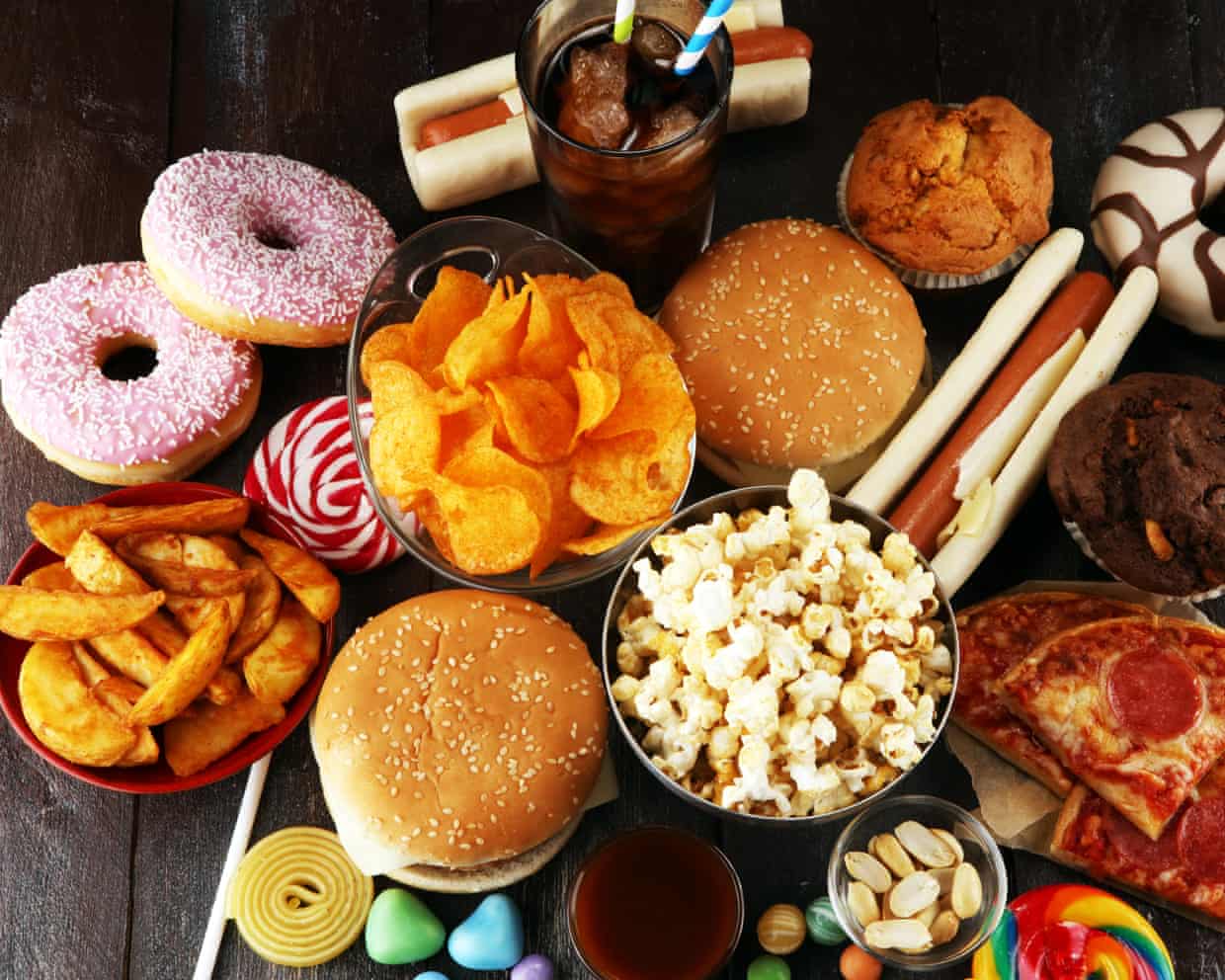Ultra-processed food linked to harm in every major human organ, study finds

Ultra-processed food (UPF) is linked to harm in every major organ system of the human body and poses a seismic threat to global health, according to the world’s largest review.UPF is also rapidly displacing fresh food in the diets of children and adults on every continent, and is associated with an increased risk of a dozen health conditions, including obesity, type 2 diabetes, heart disease and depression.The sharp rise in UPF intake worldwide is being spurred by profit-driven corporations using a range of aggressive tactics to drive consumption, skewer scientific debate and prevent regulation, the review of evidence suggests.The findings, from a series of three papers published in the Lancet, come as millions of people increasingly consume UPF such as ready meals, cereals, protein bars, fizzy drinks and fast food.In the UK and US, more than half the average diet now consists of UPF.
For some, especially people who are younger, poorer or from disadvantaged areas, a diet comprising as much as 80% UPF is typical.Evidence reviewed by 43 of the world’s leading experts suggests that diets high in UPF are linked to overeating, poor nutritional quality and higher exposure to harmful chemicals and additives.A systematic review of 104 long-term studies conducted for the series found 92 reported greater associated risks of one or more chronic diseases, and early death from all causes.One of the Lancet series authors, Prof Carlos Monteiro, professor of public health nutrition at the University of São Paulo, said the findings underlined why urgent action is needed to tackle UPF.“The first paper in this Lancet series indicates that ultra-processed foods harm every major organ system in the human body.
The evidence strongly suggests that humans are not biologically adapted to consume them,”He and his colleagues in Brazil came up with the Nova classification system for foods,It groups them by level of processing, ranging from one – unprocessed or minimally processed foods, such as whole fruits and vegetables – to four: ultra-processed,This category is made up of products that have been industrially manufactured, often using artificial flavours, emulsifiers and colouring,They include soft drinks and packaged snacks, and tend to be extremely palatable and high in calories but low in nutrients.
They are also designed and marketed to displace fresh food and traditional meals, while maximising corporate profits, Monteiro said.Critics argue UPF is an ill-defined category and existing health policies, such as those aimed at reducing sugar and salt consumption, are sufficient to deal with the threat.Monteiro and his co-authors acknowledged valid scientific critiques of Nova and UPF – such as lack of long-term clinical and community trials, an emerging understanding of mechanisms, and the existence of subgroups with different nutritional values.However, they argued future research must not delay immediate action to tackle the scourge of UPF, which they say is justified by the current evidence.“The growing consumption of ultra-processed foods is reshaping diets worldwide, displacing fresh and minimally processed foods and meals,” Monteiro warned.
Sign up to Detox Your KitchenA seven-week expert course to help you avoid chemicals in your food and groceries.after newsletter promotion“This change in what people eat is fuelled by powerful global corporations who generate huge profits by prioritising ultra-processed products, supported by extensive marketing and political lobbying to stop effective public health policies to support healthy eating.”The second paper in the series proposes policies to regulate and reduce UPF production, marketing and consumption.Although some countries have brought in rules to reformulate foods and control UPF, “the global public health response is still nascent, akin to where the tobacco control movement was decades ago”, it said.The third paper says that global corporations, not individual choices, are driving the rise of UPF.
UPF is a leading cause of the “chronic disease pandemic” linked to diet, with food companies putting profit above all else, the authors said.The main barrier to protecting health is “corporate political activities, coordinated transnationally through a global network of front groups, multi-stakeholder initiatives, and research partners, to counter opposition and block regulation”.Series co-author Prof Barry Popkin, from the University of North Carolina, said: “We call for including ingredients that are markers of UPFs in front-of-package labels, alongside excessive saturated fat, sugar, and salt, to prevent unhealthy ingredient substitutions, and enable more effective regulation.”The authors also proposed stronger marketing restrictions, especially for adverts aimed at children, as well as banning UPF in public places such as schools and hospitals and putting limits on UPF sales and shelf space in supermarkets.One success story is Brazil’s national school food programme, which has eliminated most UPF and will require 90% of food to be fresh or minimally processed by 2026.
Scientists not involved in the series broadly welcomed the review of evidence but also called for more research into UPF, cautioning that association with health harm may not mean causation,

Ultra-processed food linked to harm in every major human organ, study finds
Ultra-processed food (UPF) is linked to harm in every major organ system of the human body and poses a seismic threat to global health, according to the world’s largest review.UPF is also rapidly displacing fresh food in the diets of children and adults on every continent, and is associated with an increased risk of a dozen health conditions, including obesity, type 2 diabetes, heart disease and depression.The sharp rise in UPF intake worldwide is being spurred by profit-driven corporations using a range of aggressive tactics to drive consumption, skewer scientific debate and prevent regulation, the review of evidence suggests.The findings, from a series of three papers published in the Lancet, come as millions of people increasingly consume UPF such as ready meals, cereals, protein bars, fizzy drinks and fast food.In the UK and US, more than half the average diet now consists of UPF

Plastic surgeons wrestle with requests for ‘Mar-a-Lago face’: ‘You’re going to look like Maleficent’
The puffy, artificial look is rising in popularity - thanks to Maga elite such as Kristi Noem and Matt GaetzPicture a plastic surgeon’s office. You might imagine a sleek Los Angeles practice, with discreet entrances meant to conceal celebrities from the paparazzi. Maybe a Dallas high-rise, where monied housewives spend on postpartum “mommy makeovers”. Or a Miami location, where influencers and OnlyFans stars film TikToks of their BBLs. One city you might not think of is Washington DC

‘I knew I was starting to have a seizure’: women describe lasting effects of being ‘choked’ during sex
When Sophie* woke up on the floor after having a seizure, it took a while before she could comprehend that it had been caused by a man strangling her during sex.“I blacked out, my legs were kicking, I broke a glass,” she says. At 19, it was the first and only time anything like that had happened to her. “When I came to, I couldn’t work out who he was, where I was, what was going on. And it was utterly terrifying

Nearly half of sexually active young people in UK have experienced strangulation, study shows
More than two in five sexually active under-18s in the UK have either been strangled or strangled someone during sex, research has found, despite the serious dangers of the practice.“Choking”, as it is commonly known, has become normalised in young people’s sexual habits, the study by the Institute for Addressing Strangulation (Ifas) showed, with 43% of sexually active 16- and 17-year-olds having experienced it.More than half of people under the age of 35 have experienced it, with nearly a third wrongly believing there are safe ways to strangle someone.The survey also revealed a crisis of distress among those on the receiving end, with 36% saying they felt scared during the experience and 21% suffering dangerous physical symptoms, including dizziness and even loss of consciousness.It also showed a consent gap, with more perpetrators of strangulation believing their partner had consented to it in advance than those who had experienced it, with 1% saying they had explicitly not agreed to it the last time it happened

Children in care who lash out may no longer face automatic arrest under UK review
Vulnerable young people in care who assault staff or damage property will not automatically be arrested by police or charged, under proposals intended to reduce the excessive criminalisation of looked-after children.A government review will examine how children in state care who exhibit challenging behaviour can be offered targeted support such as trauma counselling rather than being punished through the criminal justice system.The aim is to restrict the “over-policing” of looked-after young people and reduce disproportionate numbers who offend while in care. Children in care are 10 times as likely to receive a caution or conviction than those not in care.The review, expected to report in the spring, aims to tighten an existing protocol introduced by the previous government in 2018

Woman killed herself after south London hospital neglect, coroner concludes
A woman killed herself after a south London psychiatric unit failed to search her possessions adequately, a coroner has concluded.Michelle Sparman, a personal trainer and call dispatcher for the Metropolitan police from Battersea, south-west London, died on 28 August 2021 at Kingston hospital, four days after trying to take her own life.The assistant coroner, Bernard Richmond KC, concluded that Sparman, 48, died of a hypoxic brain injury, determining she had died by “suicide whilst the balance of her mind was disturbed, contributed to by neglect”.He determined four probable causes of death: her struggles with anxiety and depression, including impulsiveness; a “difficult relationship” with her ex-partner, including “intemperate and excessive texting” from him, which called into question her mental health and fitness to be a mother; her “justifiable feelings of abuse” as a result of his behaviour, and inadequate searching on leaving and entering Rose Ward, a locked 20-bed female-only mental health unit at Queen Mary’s hospital in Roehampton.He cited her perimenopausal symptoms and financial and professional problems as possible causes

‘No contract, no coffee’: what to know about the Starbucks workers’ strike in over 40 US cities

UK inflation dips to 3.6% despite accelerating food price growth – as it happened

TikTok to give users power to reduce amount of AI content on their feeds

Meta wins major US antitrust case and won’t have to break off WhatsApp or Instagram

Ashes 2025-26: Guardian writers’ predictions for the series

Daly recalled to face Argentina as Borthwick makes six changes to England